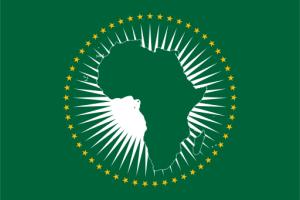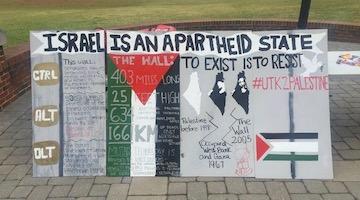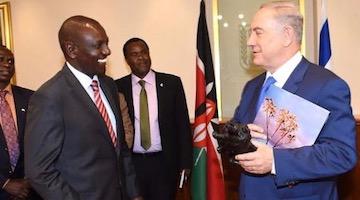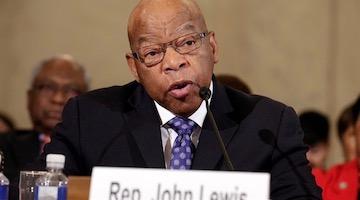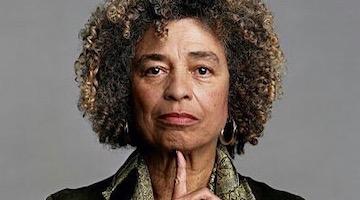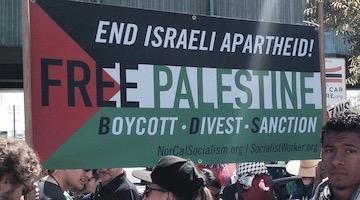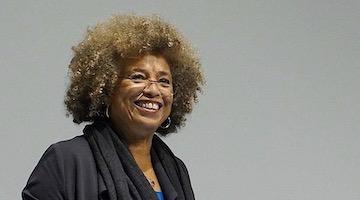Delegates to a conference on Global Africa at Oxford University say Zionists and their apologists are targeting the academy.
“An international academic conference on Global Africa was co-opted into a project to legitimize the settler-colonial, apartheid state of Israel.”
On June 27 and 28 of this year, we attended a conference titled “Racialization and Publicness in Africa and the African Diaspora,” hosted by Oxford University’s Africa Studies Center and their School of Global and Area Studies. The conference was held to “address the contemporary problem of racialization in Africa and the African Diaspora.” Organizers wanted to explore how “people of African descent are racialized… [and] why and how racial identities and categories are constructed, imagined and inscribed (in)to the social, political and economic processes, practices and relationships in Africa and the African Diaspora.”
Instead, an international academic conference on Global Africa was co-opted into a project to legitimize the settler-colonial, apartheid state of Israel and “black-wash” its racist policies and practices. As such, and in light of Israel’s ongoing attempts to normalize its relations with African states in coordination with US imperialism, while ingratiating itself to African diaspora communities, we want to sound a warning to future Black Studies and African Studies conference organizers who may encounter similar tactics by Zionist organizations.
“At first glance, the collective title appeared innocuous.”
In the original call for papers, conference organizers used the languages of anti-racism, anti-colonialism, Pan-Africanism, and intersectionality. They invoked the murder of Trayvon Martin and the UK’s unlawful detention and deportations of members of the Windrush generation, and they referenced the work of radical black intellectuals including W.E.B. Du Bois and Frantz Fanon. The conference’s 12 panels were to be anchored by keynotes from anthropologist Faye V. Harrison and philosopher Achille Mbembe (Mbembe was unable to attend).
Of the 12 panels, two were listed under one title (as Part 1 and Part 2): “Notions of Diaspora and Homeland: The Impact of the Contemporary Emergence of Racism(s), Antisemitism(s), Nationalism(s) and White Supremacy in the Age of Globalization.” At first glance, the collective title appeared innocuous. It seemed properly scholarly, if slightly outdated, and appeared to fall within the expressed themes of the conference. Yet a closer look at the make-up of the panels revealed some surprising things.
Both panels were organized by a group called the Institute for the Study of Global Antisemitism and Policy (ISGAP)—an advocacy body, not an academic organization. It was founded by Charles Asher Small, a Canadian without a permanent academic position who holds a degree from St. Anthony’s College, Oxford. In a 2019 interview, Small described ISGAP as “an intellectual grassroots movement within the academy” whose main aims include fighting the Boycott, Divestment, and Sanctions (BDS) movement, a movement Small has equated with anti-Semitism. The ISGAP works by “conducting strategic research and providing intelligence” in order to “influence future generations of policymakers, scholars and community leaders.”
“Their approach is one of targeting of scholarly spaces and appropriation of academic language.”
Whereas other Zionist organizations have used lawfare and blacklistingto dampen Palestine solidarity on university campuses, the strategy adopted by ISGAP appears to be somewhat different. On one hand, their approach is one of targeting of scholarly spaces and appropriation of academic language. On the other they aim to incite dissent and strife within academic circles for the purposes of self-promotion and publicity, using the banner of “academic free speech” as a bludgeon against critique.
The ISGAP panelists at the Oxford conference formed a strange unit. Their panelists included a Likud Party member of the Israeli Knesset, a clinical psychologist and ISGAP board member who had never written on Africa, a Grinnell college anthropologist interested in “double consciousness” and Israeli diversity, a Tel Aviv University political scientist, as well as Charles Small himself. Many of the presenters on the two ISGAP panels were from Historically Black Colleges and Universities (HBCUs) in the United States. They included Harold V. Bennett of Morehouse, Valerie Ann Johnson of Bennett College, Carlton Long, an educational consultant formerly of Morehouse, and Ansel Brown of North Carolina Central University. Brown took over the entire time allotted to the first ISGAP panel with a fifty-minute presentation titled “Zionism and Pan-Africanism: A Common Journey to Recapture Ethnic Self-Realization.”
The HBCU connection is important. In recent years, the right-wing American Israel Public Affairs Committee (AIPAC) has been recruiting at Black colleges, targeting students and faculty interested in international politics. The AIPAC has sponsored travel to Washington DC to meet with politicians who are supporters of Israel, and provided all-expenses paid trips to Israel. Its aim is to cultivate sympathy for Zionism while driving a wedge between Black and Palestinian liberation struggles.
“Many of the presenters on the two ISGAP panels were from HBCUs in the United States.”
Even before the ISGAP panels began, many conference participants expressed concern about their inclusion in the program. They were disturbed by the connections asserted between Israel, a state founded on ethnic cleansing and the dehumanization and dispossession of the indigenous Palestinian population, and the radical histories of Pan-Africanism. And they were surprised and troubled by the prominence given to this view by the conference organizers. Many conference participants discussed how the ISGAP-sponsored panels appeared to be designed to disrupt the proceedings, mirroring what was seen at previous conferences, especially when it came to questions of BDS.
In response, the conference participants demanded a public conversation with the organizers in order to discuss the Oxford African Studies Centre’s relationship to ISGAP. But our questions and concerns were met with redirection, and in some cases a dismissive mirth, and we were frankly surprised by the unwillingness to have an open conversation. Meanwhile, some ISGAP-affiliated participants attempted to squelch our inquiries by alleging that our concerns were encouraging anti-Semitism, racism, and, ironically, denying “freedom of expression.”
On the second day of the conference, a number of conference participants ceded their presentation time, allowing us the opportunity to meet to discuss our concerns. A majority of conference participants attended the meeting during which they expressed relief that we were able to come together as a collective, especially since academic settings often encourage isolation, atomization, and alienation. Collectively, we drafted a statement disassociating ourselves from ISGAP, and we asked that the Oxford’s African Studies Centre post our statement on their website. The Centre refused to do so. Instead, the leadership of the Centre released its own statement, denying any connection to ISGAP while asserting a commitment to free intellectual exchange.
“Our questions and concerns were met with redirection.”
We strongly believe that part of the African Studies Centre’s response was to mitigate the fact that so many conference participants were disturbed by ISGAP’s prominent presence. To this end, it was even suggested by some conference organizers that one prominent senior male scholar had spearheaded this protest.
This was not the case. Indeed, despite the efforts of the organizers, as a group we had spontaneously taken over the conference and turned it into a collective, self-organized, multi-generational forum for political education, each of us learning and making new calculations and interventions in response to the pushback from the African Studies Centre and ISGAP affiliates. Our collectively-written response was posted on the website of the Frantz Fanon Foundation on July 4, 2019.
To be sure, there was some anxiety expressed about the collective statement. Some participants worried that if we made our concerns public, we would implicate the Oxford African Studies Centre, which would have a grave impact on efforts to diversify the university. Indeed, ISGAP’s Charles Small, who sat in the audience observing our deliberations, suggested that we not do anything that could jeopardize the position of the Center’s director (Oxford’s first Black Rhodes Professor), whom he described as an old friend.
We worried about the potential backlash from Oxford and elsewhere to those graduate students and untenured faculty who wanted to lend their voices in support. A number of senior faculty were concerned about reprisal, and one scholar, who at the last minute asked for their name to be removed from the statement, encouraged us to “acknowledge the atmosphere of intimidation and fear fostered throughout this process.”
“A number of senior faculty were concerned about reprisal.”
But in the end, for the signatories (and for many who expressed support, but felt they could not sign), there was a sense that we could not let the study of Global Africa be hijacked by a Zionist lobbying group. We also could not support the defamation and desecration of the history of pan-Africanism by academic charlatans and agents of a racist, settler-colonial state.
The organized attempt by ISGAP to influence the conference was little more than a continuation of Zionist racism, dressed up in the finery of academic language and, in particular, the staid gowns of Oxford. But we should note its significance and understand that such efforts will be repeated again.
If we are to maintain the political and intellectual integrity of the study of Global Africa, we must be wary of such campaigns in the future—and we need to continue to strengthen and renew the connections between struggles against neocolonialism, racial capitalism, and imperialism across the globe in order to combat them.
This article previously appeared in Africaisacountry.com
Samar Al-Bulushi is a contributing editor and Assistant Professor at UCI Irvine, Department of Anthropology.
Peter James Hudson is an Associate Professor of African American Studies and History at UCLA and author of Bankers and Empire: How Wall Street Colonized the Caribbean(Chicago 2017).
Zachary Mondesire is a PhD candidate in Anthropology at the University of California, Los Angeles.
Corrina Mullin is part-time faculty in Global Studies at the New School.
Jemima Pierre is an Associate Professor of African American Studies and Anthropology at UCLA and author of The Predicament of Blackness: Postcolonial Ghana and the Politics of Race.



